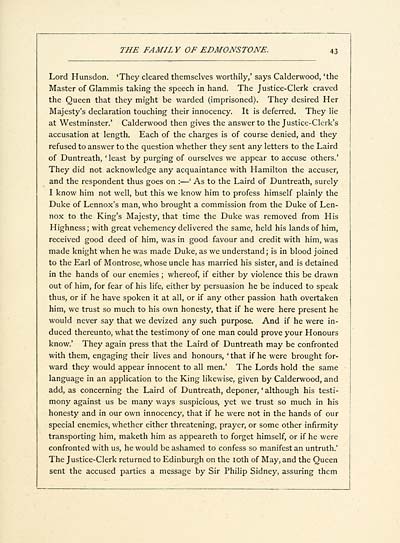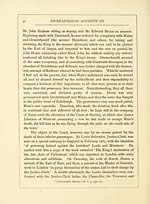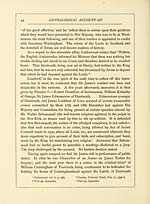Download files
Complete book:
Individual page:
Thumbnail gallery: Grid view | List view

THE FAMIL Y OF EDMONSTONE. 43
Lord Hunsdon. 'They cleared themselves worthily,' says Calderwood, 'the
Master of Glammis taking the speech in hand. The Justice-Clerk craved
the Queen that they might be warded (imprisoned). They desired Her
Majesty's declaration touching their innocency. It is deferred. They lie
at Westminster.' Calderwood then gives the answer to the Justice-Clerk's
accusation at length. Each of the charges is of course denied, and they
refused to answer to the question whether they sent any letters to the Laird
of Duntreath, ' least by purging of ourselves we appear to accuse others.'
They did not acknowledge any acquaintance with Hamilton the accuser,
and the respondent thus goes on : — ' As to the Laird of Duntreath, surely
I know him not well, but this we know him to profess himself plainly the
Duke of Lennox's man, who brought a commission from the Duke of Len-
nox to the King's Majesty, that time the Duke was removed from His
Highness; with great vehemency delivered the same, held his lands of him,
received good deed of him, was in good favour and credit with him, was
made knight when he was made Duke, as we understand ; is in blood joined
to the Earl of Montrose, whose uncle has married his sister, and is detained
in the hands of our enemies ; whereof, if either by violence this be drawn
out of him, for fear of his life, either by persuasion he be induced to speak
thus, or if he have spoken it at all, or if any other passion hath overtaken
him, we trust so much to his own honesty, that if he were here present he
would never say that we devized any such purpose. And if he were in-
duced thereunto, what the testimony of one man could prove your Honours
know.' They again press that the Laird of Duntreath may be confronted
with them, engaging their lives and honours, ' that if he were brought for-
ward they would appear innocent to all men.' The Lords hold the same
language in an application to the King likewise, given by Calderwood, and
add, as concerning the Laird of Duntreath, deponer, ' although his testi-
mony against us be many ways suspicious, yet we trust so much in his
honesty and in our own innocency, that if he were not in the hands of our
special enemies, whether either threatening, prayer, or some other infirmity
transporting him, maketh him as appeareth to forget himself, or if he were
confronted with us, he would be ashamed to confess so manifest an untruth.'
The Justice-Clerk returned to Edinburgh on the 10th of May, and the Queen
sent the accused parties a message by Sir Philip Sidney, assuring them
Lord Hunsdon. 'They cleared themselves worthily,' says Calderwood, 'the
Master of Glammis taking the speech in hand. The Justice-Clerk craved
the Queen that they might be warded (imprisoned). They desired Her
Majesty's declaration touching their innocency. It is deferred. They lie
at Westminster.' Calderwood then gives the answer to the Justice-Clerk's
accusation at length. Each of the charges is of course denied, and they
refused to answer to the question whether they sent any letters to the Laird
of Duntreath, ' least by purging of ourselves we appear to accuse others.'
They did not acknowledge any acquaintance with Hamilton the accuser,
and the respondent thus goes on : — ' As to the Laird of Duntreath, surely
I know him not well, but this we know him to profess himself plainly the
Duke of Lennox's man, who brought a commission from the Duke of Len-
nox to the King's Majesty, that time the Duke was removed from His
Highness; with great vehemency delivered the same, held his lands of him,
received good deed of him, was in good favour and credit with him, was
made knight when he was made Duke, as we understand ; is in blood joined
to the Earl of Montrose, whose uncle has married his sister, and is detained
in the hands of our enemies ; whereof, if either by violence this be drawn
out of him, for fear of his life, either by persuasion he be induced to speak
thus, or if he have spoken it at all, or if any other passion hath overtaken
him, we trust so much to his own honesty, that if he were here present he
would never say that we devized any such purpose. And if he were in-
duced thereunto, what the testimony of one man could prove your Honours
know.' They again press that the Laird of Duntreath may be confronted
with them, engaging their lives and honours, ' that if he were brought for-
ward they would appear innocent to all men.' The Lords hold the same
language in an application to the King likewise, given by Calderwood, and
add, as concerning the Laird of Duntreath, deponer, ' although his testi-
mony against us be many ways suspicious, yet we trust so much in his
honesty and in our own innocency, that if he were not in the hands of our
special enemies, whether either threatening, prayer, or some other infirmity
transporting him, maketh him as appeareth to forget himself, or if he were
confronted with us, he would be ashamed to confess so manifest an untruth.'
The Justice-Clerk returned to Edinburgh on the 10th of May, and the Queen
sent the accused parties a message by Sir Philip Sidney, assuring them
Set display mode to:
![]() Universal Viewer |
Universal Viewer | ![]() Mirador |
Large image | Transcription
Mirador |
Large image | Transcription
Images and transcriptions on this page, including medium image downloads, may be used under the Creative Commons Attribution 4.0 International Licence unless otherwise stated. ![]()
| Histories of Scottish families > Genealogical account of the family of Edmonstone of Duntreath > (61) |
|---|
| Permanent URL | https://digital.nls.uk/95354187 |
|---|
| Description | A selection of almost 400 printed items relating to the history of Scottish families, mostly dating from the 19th and early 20th centuries. Includes memoirs, genealogies and clan histories, with a few produced by emigrant families. The earliest family history goes back to AD 916. |
|---|

